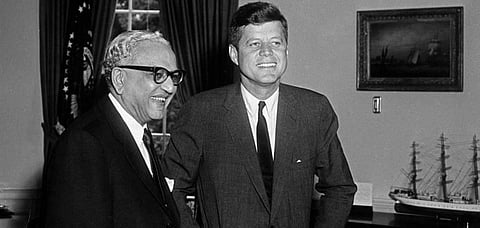

The first permanent Indian Chief Justice of the Bombay High Court, Mohammadali Carim Chagla, whose 42nd death anniversary falls on February 9, was endowed with qualities that made his court a temple of justice for litigants, an academy of legal education for the advocates and a beacon and benchmark of hope for the public.
According to Nani Palkhivala, the great judge's court could be described as 'the court where Justice Chagla presided and where law approximated closest to justice'.
The late judge lived up to the best ideals of law and justice. To the Romans, justice was a goddess whose symbols were a throne that tempests could not shake, a pulse that passion could not stir, eyes that were blind to any feeling of favour or ill will, and the sword that fell on the offenders with equal certainty and with impartial strength. Justice Chagla embodied all these qualities.
Upon retirement from the Bombay High Court, Justice Chagla held many assignments like that of the Vice Chancellor of Bombay University, Acting judge in the International Court of Justice, Ambassador to USA, UK, Union Education Minister and Union Minister for External Affairs to name but a few. After completing all his assignments, he devoted himself to the most important office –- that of being a citizen.
At the age of 75, he made one of his greatest contributions by fighting against the Emergency as a citizen, holding it as the "dimmest period of Indian Republic". He displayed an undying conviction that freedom and liberty are the inalienable heritage of man and that freedom only dies when it dies in the hearts of men.
The ongoing controversy between the judiciary and the Government over the collegium system was one he would have waded into without a second thought.
This has always been an issue of concern as the independence and impartiality of judiciary in a parliamentary democracy depends upon the process of appointment of judges.
Justice Chagla's views in the matter are significant and apt.
In his autobiography, Roses In December, he writes, "Another important convention I succeeded in persuading the Government to accept was that in the appointment of High Court Judges, the initiative should come from the Chief Justice and not from the Government. I told the Government that I knew that under the Constitution the only right the Chief Justice of a High Court had was to be consulted with regard to appointment of a judge, but for the purpose of establishing a strong, independent-minded judiciary, it was necessary to ensure that there was no scope for the exercise of pressure or influence in the choice of candidates for a High Court judgeship. I told them frankly that the Chief Justice was in a better position to resist and withstand pressures than was the Government. I agreed that Government was not bound to accept the recommendation of the Chief Justice. It could reject it, but in such cases it should ask the Chief Justice again to suggest other names."
He professed, practiced and promoted independence of judiciary -- and with fierce conviction.
According to him, our judiciary plays a major role that in a sense placed it above Parliament. It does not merely interpret the laws passed by it, but also decides on their constitutionality. In our country, the Constitution is supreme.
The judiciary, he always felt, had been designated by the Constitution to keep parliament within the bounds of the Constitution. If the parliament oversteps, the judiciary can strike down the law. The judgement of the Supreme Court becomes the law of the land unless parliament acting under its power to amend changes the law as declared by the Supreme Court without, of course, disturbing the 'basic structure’ of the Constitution.
In this connection it is relevant to recollect what he said in a 1974 lecture on the Role of Judiciary in Parliamentary Democracy.
"It is a mere truism to say that if the judiciary is to be the custodian of the rights of citizens, it must inspire the confidence of the public. It must be independent and impartial. It must not call anyone its master nor should anyone be allowed to call it its servant. It must assign to the waste paper basket any directions it may receive even from the President or the Prime Minister.
"Every judge, before he comes to the Bench, has a personal philosophy based on what Holmes (American jurist Oliver Wendell Holmes) called the inarticulate major premise. He may believe in a certain ideology. He may believe in communism, socialism or the tenets of the Maha Sabha or the Muslim League. He must leave all these behind and forget them. The only scripture he must consult and the only Bible he must revere is the Constitution. His philosophy must be the philosophy which is to be found in the preamble of the Constitution. That must be his friend, philosopher and guide, the light which must illumine his years on the Bench.
"The Courts are not a department of Government. They are an authority to coordinate with the legislature and the executive. Even parliament, however wide and vast its powers, can only function under the Constitution. Even if legislation is passed by an overwhelming majority and parliament has expressed its clear intention in no unequivocal terms, the legislation can be tested on the anvil of judicial review and if it fails the test, parliament must submit to the decision of the Court. It is a mistake to call this a confrontation between parliament and the judiciary. Each is discharging its duty assigned to it by the Constitution. If we have faith in our Constitution, we should call it collaboration between two coordinate authorities rather than confrontation," he underlined then.
Adhering to the wisdom of Justice Chagla would be the fitting tribute to his memory and for the survival of parliamentary democracy.
(Ashok Kumar Bal is a former IRS officer.)